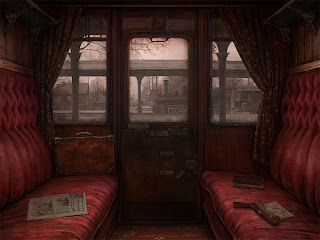At the party I
attended on Sunday a memoirist sought me out. He’d heard from the host that my
book sold out and I’d sold my screenplay. I can understand how good that sounds
to someone who does not know the backstories of either project and who has
unrealized projects of their own.
He asked me how I
secured the deals with my publishers. I killed his dreams by telling him I
published my own book and that although I wrote the screenplay it was my friend
who saw a screenplay in my life story and sold it.
So I asked him:
“Why do you want to publish your work?”
As a child, I
wrote for fun. I kept diaries and wrote stories for school publications and so
on; my father was a journalist and editor. I took writing and literature
courses at UBC and then took a fifth year in the education faculty in order to
monetize my education; I became a teacher.
I hated teaching,
so I quit and applied myself to my passion: Theatre. I stank as an actor, was
more successful as a stage manager but the big bucks came in when I started
writing. I hit my stride with persuasive copywriting. I was a whiz at grant
applications and the interim and final reports they required.
My persuasive
writing skills allowed me to move mountains: I convinced boards of directors
and municipal councils to adopt cultural policies and initiatives. Then the
shit hit the fan.
When the economic
environment changed in the 1980s, endurance in the arts came not to those with
artistic integrity, it came to those with big marketing budgets and not one of
us in the arts — none of my peers — had marketing knowledge or experience. The
entrepreneurs survived.
I could not
afford to go back to school to learn marketing, but I went back to my college
and asked some professors who I could effectively learn on the job and they
told me that the best thing I could do would be to get a job in direct mail
marketing because the things you direct mail market either sell or they don’t
and if they do, you are marketing well. If they don’t you get fired. So I got a
job with a friend’s business.
David was adding
a direct mail component to his retail business and redirecting all his
advertising money from media to direct mail. I got the job of designing and executing
our campaigns and I rocked it. I even won awards — three of them — for the junk
mail I developed, and not from advertisers but from arts organizations because
I made our advertising material essential reading for the artists who were
David’s customers.
The research I
did for that job gave me a career that culminated in me teaching all that I
learned about marketing art at Emily Carr University of Art and Design.
In retirement,
came the writing I had never had time to do when I was hiring myself out as a
technical writer. I wrote the best seller (and the crappy seller that followed
it), two plays and then, pushed by my visionary friend, I turned the first play
into the screenplay that my friend sold.
The book that
sold well was not written for money. I truly wanted to write a book for
Canadian visual artists. I wanted to help them by explaining all I know about
the things professional visual artists need to know that are NOT about studio
practice. But I did not want to lose money, so my eye was on the bottom line.
My reward: It grossed about ninety grand.
All of that is to
make clear what my choice was. Given that I see the motivation of writers as
either fame or money, I wrote for money. I had to. I had no other skill.
So when I asked
the guy at the party why he wanted to publish his work, he said that he wanted
to leave a legacy. He wants fame. Good luck with that, I said. They all want fame and I can’t help anyone
who wants fame. But when someone wants to make a living, that person and I
click. That person, I can help.
If the screenplay
goes into development, my last monetary writing job will be tweaking the
screenplay with changes the director and producers require. Will that happen?
Who knows? Come August, the producers have to renew the option agreement. If
they do, that will be a good sign. If they don’t, my professional life is over.
In the meantime,
I work on Rita. It’s a script because
I will never write technically again. I am hooked on dialogue. And here’s the
thing: it is purposeless. It will not earn me any money, nor will it or
anything I ever do bring me fame — except (thankfully) amongst those I love.
So Rita is very hard to finish. It may be
that that is its destiny: To never be finished. Perhaps its purpose is to be an
endless paradise, a place in which I can lose myself and exercise my imagination
… and with no purpose, like play, when I was a child.
Fame is for very,
very few and not me. Or him. I asked the guy: “Do you think the value of your
work might lie in its execution? If you are proud of it, might that not be its
purpose and your reward? Do you really need anything else from it?”
My questions did
not impress him; he wants validation. I heard a tree falling in the forest.
 |
| Margaret Hamilton, lead software engineer of the Apollo Project, stands next to the code she wrote by hand and that was used to take humanity (sic) to the moon. 1969 |






















No comments:
Post a Comment